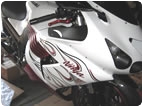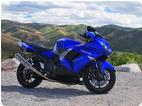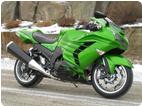.
Can we all agree that dyno numbers can be deceiving?
I am sure all of you have seen or had a bike that is a real performer on the dyno, and just a regular performer on the track. A dyno "simulates the best "seat-of-your-pants" road testing right on the shop".
As we know, "a dynometer is a tool to help us understand, track and compare engine performance under a controlled enviroment". That being said, as I mentioned earlier, sometimes a bike with a great dyno chart does not perform well on the track.
In your opinion, which is best, track testing where you'll receive a slip of paper with your 60-foot time, e.t., and top end mph? Or do you think that after getting your bike dyno tested, the "seat-or-your-pants" feel is more accurate?
Suggested reading: Dyno operators can fix results...Exaggerated dyno gains are rampant but generally harmless, unless the dyno operator is purposely inflating (or shrinking) figures and using them to take cash from customers. Artificial numbers can hinder your progression in the sense that the claimed 10 HP increase you received from a “tune” might only be worth 2 HP had the dyno not been manipulated.
Artificially deflated numbers can also be the pits, as an operator can take a bike that’s actually making 105 HP and tweak the dyno to read 100 HP (or less) for the baseline. After the customer forks over some cash, the operator pretends to tweak the map for more power when in reality all he did was adjust the dyno. With the dyno back in calibration (and without a single change to the bike) you’ll see a power increase back to the original mark of 105 HP.
Disclaimer: I am NOT in any way shape or form implying that YOUR dyno test has been manipulated.
Talk amongst yourselves....
Kofla











